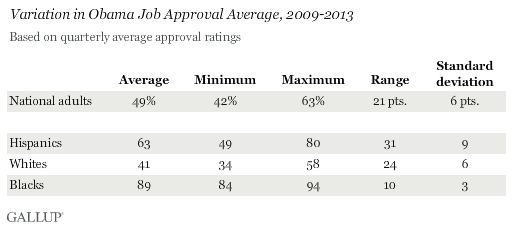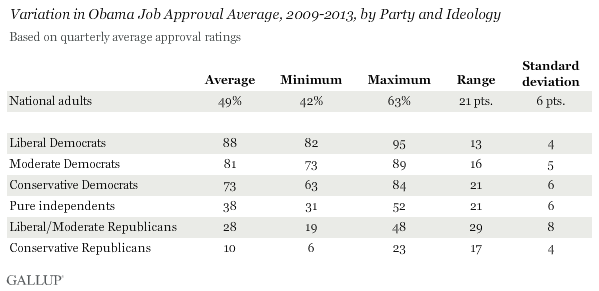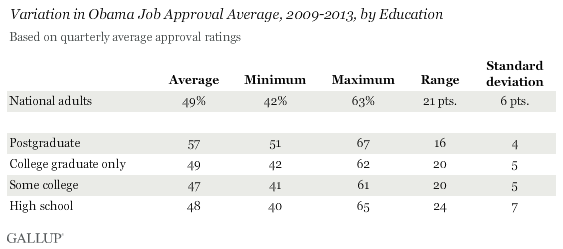PRINCETON, NJ -- President Barack Obama's job approval is more fluid among certain groups of Americans than among others. Of the major subgroups, U.S. Hispanics' approval of Obama has shown the greatest variation during his more than five years in office, with quarterly approval averages ranging from a low of 49% to a high of 80%. Obama's quarterly approval among Hispanics in the second quarter of this year was 20 percentage points higher than the national adult average during that time, while at other times, such as his 11th quarter in office, Hispanic approval was only seven points above the national average. This variance in quarterly approval ratings is significantly greater than is the case for non-Hispanic whites and blacks.

Among all national adults, Obama's quarterly job approval average has had a range of 21 points, from 42% to 63%. His job ratings started high in his honeymoon phase in 2009, sagged to lows in his 11th and 12th quarters in office, recovered commensurate with his re-election in November 2012, and have sagged slightly since.
Hispanics -- like most groups -- have generally followed this pattern, but less precisely than other racial and ethnic groups have. In addition to the 31-point range in quarterly approval ratings, another measure of variability, statistical standard deviation, is 9 points for Hispanics, compared with 6 points for all U.S. adults.
By contrast, whites and blacks have shown narrower patterns of deviation from the overall national average. Blacks consistently give Obama very high approval; compared with national averages, their quarterly approval averages have had a range of only 10 points. Whites have consistently given Obama approval ratings below the overall national average, but with slightly above-average variability, ranging from 34% in quarters 11 and 12, to 58% in quarter 1.
Hispanics are a key political target for both major parties, with the percentage of Hispanics of voting age growing, especially in certain states. Hispanics voted for President Obama over Mitt Romney by a margin of 71% to 27%, and show that Hispanics are significantly more likely to identify as Democrats rather than Republicans.
Still, the fact that their approval of the job Obama, a Democrat, is doing as president varies from quarter to quarter considerably more than is the case for non-Hispanics suggests that they may be less fixed in their political attitudes than one might expect.
Liberal/Moderate Republicans Vary More in Their Approval of Obama
Liberal or moderate Republicans have varied more in their approval of Obama than conservative Republicans -- or any ideological subgroup of Democrats. Although liberal/moderate Republicans' approval ratings for Obama are well below the national average, their shifts from quarter to quarter have been fairly large -- ranging from 19% in quarter 15 to 48% in Obama's first quarter in office, with a standard deviation of 8.
By comparison, conservative Republicans have given Obama quarterly approval ratings ranging between 6% and 23%, with a standard deviation of 4.

Liberal Democrats' approval has also stayed in a narrow range, 13 points, from 82% in quarter 11 to 95% in Obama's first quarter. Moderate Democrats' range in quarterly approval ratings is slightly higher, at 16 points, while conservative Democrats' range is higher still at 21 points and matches the national average.
The fact that liberal/moderate Republicans and conservative Democrats show greater variation in approval may be evidence of their having conflicting loyalties between their party identification and ideological beliefs, which can be at odds. Those whose party and ideology are more congruent show much less variability in their ratings of the president.
Postgraduates Consistently Stick by Obama
Postgraduates are another group that shows above-average approval ratings and a relatively small range in those ratings over time. Their quarterly approval ratings have ranged from 51% in quarter 12 to 67% in Obama's first quarter in office. This range of 16 points is the smallest of any educational group. Those with a high school education or less have shown above-average variability in their ratings of the president.

Implications
During his more than five years in office, President Obama's quarterly approval has varied by an average of 21 points. Some groups have shown consistent support (blacks and liberal Democrats) or opposition (conservative Republicans). Others have shifted their support significantly throughout his presidency, including groups inclined to approve of Obama, such as Hispanics, and groups inclined to disapprove of him, like liberal/moderate Republicans.
This suggests that when Obama's overall job approval ratings change, the groups most likely to be leading that change are Hispanics and liberal/moderate Republicans, and, to a lesser extent, whites and those with a high school education or less. Groups that would be among the last to shift their opinions when his overall approval rating changes are blacks, liberal Democrats, and postgraduates.
